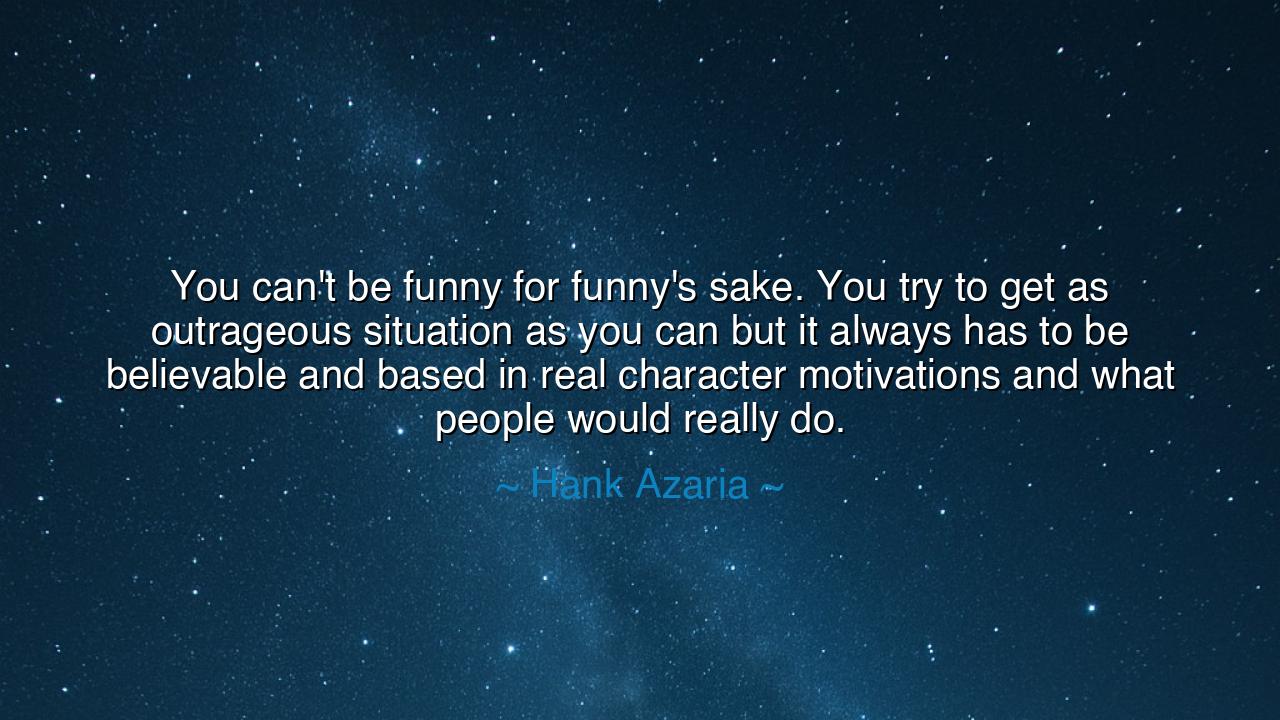
You can't be funny for funny's sake. You try to get as outrageous
You can't be funny for funny's sake. You try to get as outrageous situation as you can but it always has to be believable and based in real character motivations and what people would really do.






“You can’t be funny for funny’s sake. You try to get as outrageous a situation as you can, but it always has to be believable and based in real character motivations and what people would really do.” — so spoke Hank Azaria, the chameleon of voice and spirit, whose laughter has echoed through countless lives. In this reflection lies a principle as old as storytelling itself: that truth, not absurdity, is the foundation of great comedy. His words remind us that the power of humor does not come from exaggeration alone, but from the deep roots of human reality — from motivation, emotion, and the heart’s quiet logic. The ancients would have called this the harmony of truth and jest — the balance that separates mockery from meaning, foolishness from art.
When Azaria says, “You can’t be funny for funny’s sake,” he speaks against the emptiness of noise without substance. The wise of every age have known this truth. The poet who writes only to dazzle the crowd soon runs dry, just as the jester who performs without purpose becomes hollow. For laughter that does not arise from truth is like a spark without fire — bright for a moment, then gone. The ancients believed that all art must reflect human nature, that even the gods, when portrayed in stories, must act with recognizable passion and reason. In the same way, Azaria reminds the modern artist that even the wildest humor must grow from the soil of believability.
Consider the theater of Aristophanes, the great comic playwright of Athens. His plays were filled with absurdities — men flying to the heavens on dung beetles, women taking over the government, and citizens suing the gods. Yet beneath these outrageous scenes lay a sharp and human truth: the folly of greed, the corruption of politics, the madness of desire. His humor endures not because of its chaos, but because it mirrors the absurdities that already exist in life. Outrage, as Azaria says, must always be anchored by character — by what people would really do if pushed by their passions, fears, or pride. Only then does laughter strike not as a joke, but as revelation.
When Azaria speaks of “real character motivations,” he reveals the secret shared by both comedian and tragedian: that all art begins with empathy. To be truly funny, one must first understand what it means to be human — to feel jealousy, confusion, love, and longing. Humor without heart is cruelty; humor born from understanding is truth made light. The ancients taught that the greatest storytellers were not merely clever but compassionate — they could look into the soul of man and find both his comedy and his tragedy entwined. So too does Azaria teach us that even in the most exaggerated of performances, it is human truth that gives laughter its lasting power.
He also warns of the delicate balance between believability and outrageousness — the artist’s eternal dance between order and chaos. To be too restrained is to bore; to be too wild is to lose meaning. This is the balance of Aristotle’s Golden Mean, the wisdom of proportion in all things. In art, as in life, the key is not to abandon reason, but to stretch it — to bring the audience to the edge of disbelief and yet keep them grounded in emotion. When humor walks this razor’s edge, it transforms. It ceases to be mere laughter and becomes a kind of illumination, revealing truth in disguise.
In the modern world, where noise and spectacle often replace substance, Azaria’s words are a reminder of artistic discipline. True comedy, he says, is not built on shock alone, but on structure — on knowing why a character speaks, why he acts, and what hidden longing drives his foolishness. Just as the sculptor must know the form within the stone, the comedian must know the soul within the absurd. Only then can he breathe life into chaos and turn laughter into wisdom.
So let this teaching be passed down to all who create, speak, or perform: Do not seek to be funny — seek to be true. Let your art, your words, and your humor arise not from the need to impress, but from the courage to reveal what is real. Be bold, yes — let your stories be outrageous, your imagination vast — but always let them rest upon the foundation of human truth. For the laughter that comes from truth does not fade. It lives on, echoing through time like the laughter of the gods themselves — laughter not at our foolishness, but at the beauty of being human, forever imperfect, forever real.






AAdministratorAdministrator
Welcome, honored guests. Please leave a comment, we will respond soon